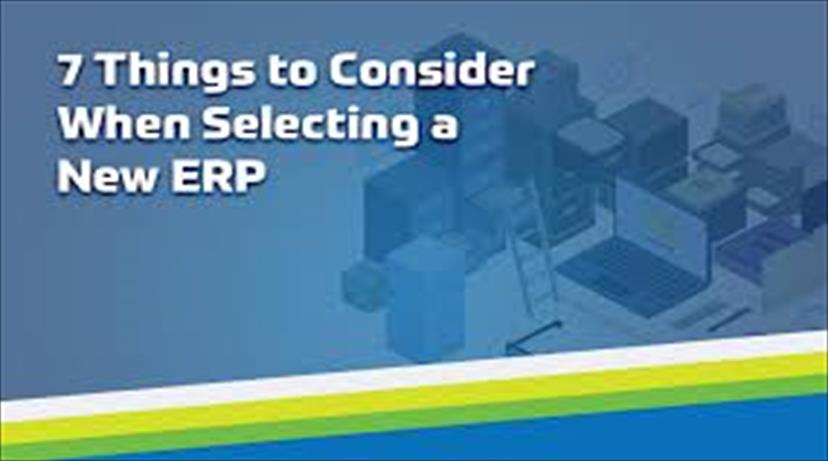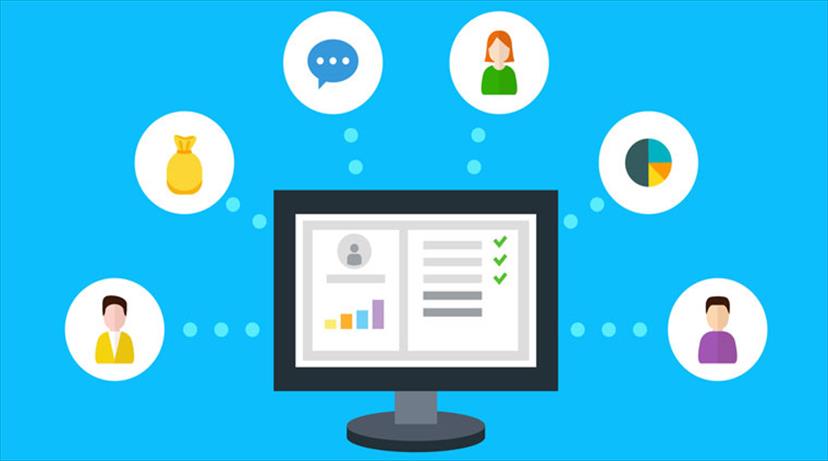One of the best company to work and IT solutions. Delivered product quickly and very fast. It was really mice working with them. I will give them move orders.
7 Things to Keep in Mind When Choosing an ERP Software
ERP selection can be complicated. Here are some of the critical factors to consider when deciding on the best ERP fit for your business

ERP selection can be problematic. That's why an ERP system is moderately useful. The ERP system you select will be the platform through which the numerous practical areas of your business combine into one collective software. It’s the umbrella that wraps and attaches all your business areas and systems, facilitating you to share data and make better, data-driven judgments across your whole operations.
Choosing and executing an ERP software solution enables you to function smartly, enhancing efficiency and visibility across your business procedures, which comprises everything from buying and sourcing, manufacturing, and inventory control to sales and marketing, distribution, and customer relationship management.
From its beginning in the early 1990s, Enterprise Resource Planning (ERP) software has become an increasingly prominent business management tool. Having evolved from a back-office operation automation software, ERP functional capabilities have drastically developed over the years and now include financial applications, customer relationship management (CRM), human resource and payroll management, and even business analytics.
ERP has been prosperous in providing real-time skills and seamless communication to various companies all over the world. Executing an Enterprise Resource Planning software is an enterprise-wide undertaking and has an importance on numerous characteristics of the business such as procedure, people, and culture. As an outcome, companies looking to deploy ERP systems must contemplate numerous factors.
How to choose an ERP system can be a difficult issue. Choosing the favorable ERP system for you is not something that should be taken lightly or done promptly. Considerable executive resources should be assigned for procuring the right system for you and then executing it.
The expense of a failed implementation can be stumbling, and costs go way beyond wasted financial investments to comprise disruption of business functions, baffled employees and stymied customers.
By the way, as you’ve possibly glimpsed that frustrated employees and frustrated customers tend to abandon you, which is about as horrible for your business as it gets. The ERP planning and selection procedure, then, are crucial for a prosperous ERP purchase. Below are five fundamental criteria you’d be wise to contemplate before deciding upon an ERP system.
Dive deeper into ERP selection with this blog: Selecting an ERP System in 7 Easy Steps. A how-to guide for choosing a new ERP system in 7 steps
1. Your ERP selection should deliver platform scalability and flexibility:
Your current list of requirements and desires should not be the only aspect that guides a purchasing decision. You must moreover contemplate what features you'll require as your business thrives or experiences change going forward into the future. An ERP system must be adaptable enough to scale with your desires as your company grows. A “bad” ERP system is one that you’ll outgrow in 5 to 10 years. You require to have that flexibility already baked into your ERP system. Otherwise, your “inflexible” ERP system may hamper your development, relatively than support it -- possibly the worst-case scenario of all.
What this implies is that you must glance beyond the standard features a system offers and consider how simple it will be for your ERP system to adapt to shifting business requirements and adopting developing technologies. If there are unnecessary restrictions on how much a specific ERP system can be customized, it may be worth looking elsewhere.
You don’t need to “bolt-on” new technologies and be forced to do complex workarounds because of an inflexible ERP system. What you need an ERP system to be is a platform for growth, meaning it’s creative enough to support your development and combine emerging technologies. What you’re doing by seeking ERP agility is future-proofing your company, and that matters a lot.
Mobile ERP is a crucial characteristic in ERP selection. Mobile devices are everywhere - they should be integrated sharply into your ERP system as well.
2. Select an ERP with support for mobile users
With the beginning of the bring-your-own-device (BYOD) workplace, more and more company users are accessing workflows and data through their mobile devices. Giving employees the proficiency to work, still, wherever, and whenever they see their comfort has stimulated productivity extensively. If mobile functionality is restricted, those efficiency gains will be difficult to realize.
Mobile-friendly is a massively crucial ERP feature
Choose an ERP solution with a dashboard that is mobile-friendly and available from anywhere at any time. When your employees are on the go, they’ll be able to skillfully access key workflows and data to avert lengthy downtime. They can work at the hotel or the customer’s site. Perhaps even more crucial is the proficiency to enter and store data all in one procedure. When employees can enter data rapidly from the field, it curtails the risk of errors that occur when they have to compile data in one place and re-enter it into the system later. Mobile-friendly is a massively crucial ERP feature, and you should be stressing on.
3. Customer suggestions or testimonials
An ERP software dealer should be able to provide you the names of a few customers to whom you can reach out and get an inner look into the entire implementation procedure. It's crucial to note that you can't just concentrate on the software itself, but should be carefully evaluating the collective experience the vendor's execution team brings and its all-around technical/business insight in partnering with businesses like yours.
In many cases where an ERP system declines to live up to expectations, it's not certain because the software was deficient, but relatively, something went incorrect during the implementation procedure, such as ineffective communication.
Listening matters so does responsiveness and building robust connections (in addition to powerful software solutions). Change isn’t simply about technology, but about procedures and people too. The people stuff isn’t “soft,” and you’d better be certain that you can trust and create a powerful combined connection between your people and the ERP vendor’s people.
Customer references are crucial in ERP selection.
You can understand a lot by discussing or visiting customer references during your ERP selection procedure.

4. Ease of use and contextualization
Each functional area of the company will operate daily with specific types of data while having no use for different kinds. The user experience should be customizable for each user so that only the greatly applicable data is illustrated. This comprises contextualization for worldwide businesses that will require region-specific data and units of measurement for all locales. Practically, a promising ERP system will be able to illustrate the favorable information to the right people at the right time in a simple, susceptible way. You should look for a huge, customizable UX, or user experience. If you require to build bulky workarounds to localize and contextualize your ERP system, that's a red flag. Your ERP system should have this already baked in.
5. Long-term costs
It's simple to get caught up in upfront costs, but you really should contemplate the whole cost of ownership (TCO) over the long haul. Evaluate long-term execution costs related to chain management. Your ERP system should be set up to mirror your future-state business procedures, so as your strategies evolve, your ERP system and the dealer will grow with you.
6. Combining ERP into existing business functions
To start the execution process, the organization executing the ERP software must gain clarity on particular business functions and the significance of integrating them with the ERP. Only functions that can enable the company to gain a competitive edge must be combined. To achieve this, map out a detailed plan of how to configure, combine and optimize the ERP system to suit individual business functions.
7. Business Process Optimization versus Customization
ERP software is expanded to automate operations irrespective of the company or business the software is implemented in. It is not extraordinary to have variations between the ERP’s functional skills and the extraordinary requirements of the company.
This should be seized as an alternative to relook at existing procedures, eradicate duplicative and obsolete procedures, and explore adopting functional procedures with the ERP software from a process optimization prism. Comprehend the ERP solution’s framework and how it relates to the company to disclose the best way to customize the ERP solution.

Conclusion -
Deploying an enterprise resource planning (ERP) system is a valuable proposition, not just in tenures of licensing dollars (SLA) and maintenance, but in terms of reliable resources and time. And yet all too often, companies, amazed by ERP vendor vows and hype -- Deploy our Tritan ERP software, and your manufacturing business will rapidly run smoother and gain huge profits!
Use the 7 things listed above in the blog as you answer the question of how to choose an ERP system (and ERP vendor) that’s favorable for you. Ready to talk about our ERP experts? Contact us today for a free demo.






0 Comment